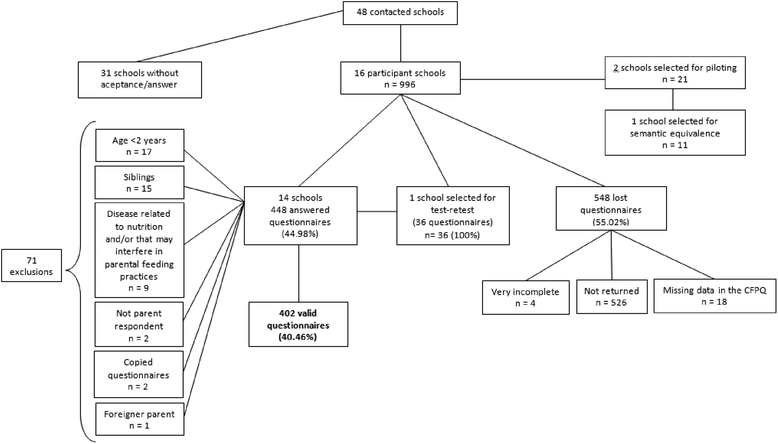Validation of the comprehensive feeding practices questionnaire in parents of preschool children in Brazil
- PMID: 27435192
- PMCID: PMC4952239
- DOI: 10.1186/s12889-016-3282-8
Validation of the comprehensive feeding practices questionnaire in parents of preschool children in Brazil
Abstract
Background: Recent national surveys in Brazil have demonstrated a decrease in the consumption of traditional food and a parallel increase in the consumption of ultra-processed food, which has contributed to a rise in obesity prevalence in all age groups. Environmental factors, especially familial factors, have a strong influence on the food intake of preschool children, and this has led to the development of psychometric scales to measure parents' feeding practices. The aim of this study was to test the validity of a translated and adapted Comprehensive Feeding Practices Questionnaire in a sample of Brazilian preschool-aged children enrolled in private schools.
Methods: A transcultural adaptation process was performed in order to develop a modified questionnaire (43 items). After piloting, the questionnaire was sent to parents, along with additional questions about family characteristics. Test-retest reliability was assessed in one of the schools. Factor analysis with oblique rotation was performed. Internal reliability was tested using Cronbach's alpha and correlations between factors, discriminant validity using marker variables of child's food intake, and convergent validity via correlations with parental perceptions of perceived responsibility for feeding and concern about the child's weight were also performed.
Results: The final sample consisted of 402 preschool children. Factor analysis resulted in a final questionnaire of 43 items distributed over 6 factors. Cronbach alpha values were adequate (0.74 to 0.88), between-factor correlations were low, and discriminant validity and convergent validity were acceptable.
Conclusions: The modified CFPQ demonstrated significant internal reliability in this urban Brazilian sample. Scale validation within different cultures is essential for a more comprehensive understanding of parental feeding practices for preschoolers.
Keywords: Child nutrition; Feeding behavior; Food consumption; Parent-child relations; Preschool child; Validation studies.
Figures


Similar articles
-
Does Examining the Childhood Food Experiences Help to Better Understand Food Choices in Adulthood?Nutrients. 2021 Mar 18;13(3):983. doi: 10.3390/nu13030983. Nutrients. 2021. PMID: 33803655 Free PMC article.
-
Feeding Practices Among Portuguese Parents of 5- to 10-Year-Olds: Psychometric Properties of the Comprehensive Feeding Practices Questionnaire.Child Care Health Dev. 2025;51(4):e70116. doi: 10.1111/cch.70116. Child Care Health Dev. 2025. PMID: 40522029
-
Associations between Parental Concerns about Preschoolers' Weight and Eating and Parental Feeding Practices: Results from Analyses of the Child Eating Behavior Questionnaire, the Child Feeding Questionnaire, and the Lifestyle Behavior Checklist.PLoS One. 2016 Jan 22;11(1):e0147257. doi: 10.1371/journal.pone.0147257. eCollection 2016. PLoS One. 2016. PMID: 26799397 Free PMC article.
-
A review of methods to assess parental feeding practices and preschool children's eating behavior: the need for further development of tools.J Acad Nutr Diet. 2012 Oct;112(10):1578-602, 1602.e1-8. doi: 10.1016/j.jand.2012.06.356. J Acad Nutr Diet. 2012. PMID: 23017568 Review.
-
Instruments assessing parental responsive feeding in children ages birth to 5 years: A systematic review.Appetite. 2019 Jul 1;138:23-51. doi: 10.1016/j.appet.2019.03.006. Epub 2019 Mar 7. Appetite. 2019. PMID: 30853452
Cited by
-
Investigation of the psychometric properties of the Comprehensive Feeding Practices Questionnaire in Turkish parents.Public Health Nutr. 2024 May 30;27(1):e148. doi: 10.1017/S1368980024001125. Public Health Nutr. 2024. PMID: 38812438 Free PMC article.
-
Parental practices, preferences, skills and attitudes on food consumption of pre-school children: Results from Nutriscience Project.PLoS One. 2021 May 25;16(5):e0251620. doi: 10.1371/journal.pone.0251620. eCollection 2021. PLoS One. 2021. PMID: 34033667 Free PMC article.
-
Does Examining the Childhood Food Experiences Help to Better Understand Food Choices in Adulthood?Nutrients. 2021 Mar 18;13(3):983. doi: 10.3390/nu13030983. Nutrients. 2021. PMID: 33803655 Free PMC article.
-
Validation of the Comprehensive Feeding Practices Questionnaire among parents of 5- to 7-year-old children in Sweden.Front Psychol. 2023 Nov 30;14:1205427. doi: 10.3389/fpsyg.2023.1205427. eCollection 2023. Front Psychol. 2023. PMID: 38098534 Free PMC article.
-
Exploratory factor analysis of The Comprehensive Feeding Practices Questionnaire (CFPQ) in a low-income hispanic sample of preschool aged children.Appetite. 2019 Sep 1;140:82-90. doi: 10.1016/j.appet.2019.04.029. Epub 2019 May 1. Appetite. 2019. PMID: 31054276 Free PMC article.
References
-
- Ministério da Saúde. Pesquisa Nacional de Demografia e Saúde da Criança e da Mulher - PNDS 2006: Dimensões do processo reprodutivo e da saúde da criança. Brasília; 2008.
-
- Nobre LN, Lamounier JA, Franceschini SCC. Padrão alimentar de pré-escolares e fatores associados. J Pediatr. 2012;88:129–36. - PubMed
-
- Instituto Brsileiro de Geografia e Estatística (IBGE). Pesquisa de Orçamentos Familiares no Brasil (POF) 2008-2009: Antropometria e estado nutricional de crianças, adolescentes e adultos no Brasil. Rio de Janeiro; 2010.
Publication types
MeSH terms
Grants and funding
LinkOut - more resources
Full Text Sources
Other Literature Sources

